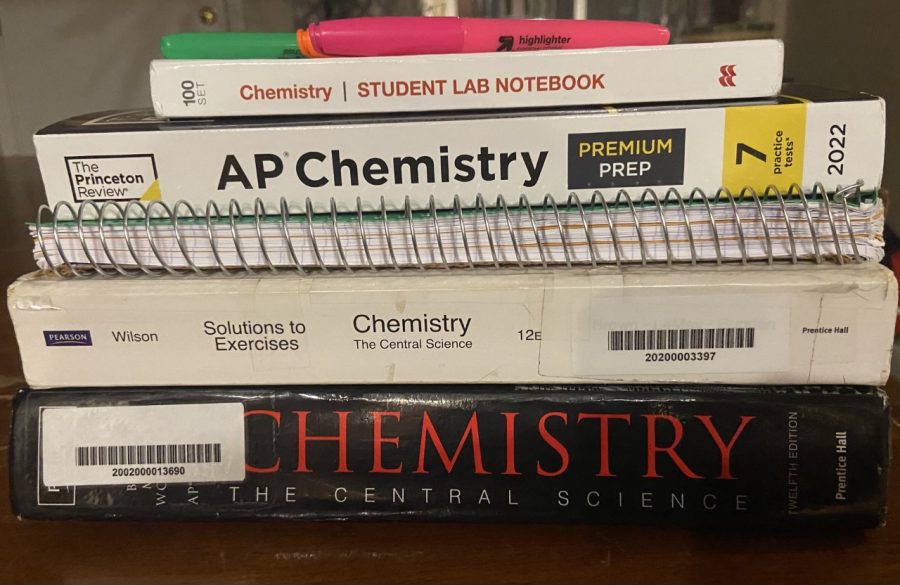AP classes are taking a toll on students
A few helpful study tools I am using to prepare for my AP Chemistry exam on May 2.
April 11, 2022
Each year, more than 2.5 million students register for AP classes in hopes of challenging themselves academically and having the opportunity to receive college credits. While it is already obvious that these courses take a ton of dedication, effort and time, they can often have a more detrimental impact on the mental health of AP students than one may realize.
It is well known that school tends to negatively impact all students in one way or another whether it is due to overwhelming assignments, studying for tests or just the academically stressful and socially competitive environment that high school students are no stranger to. According to washingtonpost.com, 83% of teenagers say that school is “a somewhat or significant source of stress,” and 27% say that they have experienced “extreme stress” during the school year. Feeling stressed and overwhelmed is a universal experience for the majority of high schoolers. Balancing schoolwork with extracurricular activities, jobs and spending time with your loved ones is difficult no matter what level of classes you take in high school. However, AP students experience the universal effects in addition to a few others that non-AP students typically do not. In a study conducted by The City University of New York, it was found that “the workload and expectations of an AP science class causes students to lose confidence in their ability to succeed in college-level science, gain stress, and earn lower grades (prior to the weights that are often attached to AP grades by secondary and postsecondary institutions).” Not only are AP classes stress-inducing and overwhelming to say the least, they are also taking a toll on the confidence and self-esteem of students.
With that being said, many AP students, including myself, strive off of our academic achievements. Because of this, we often believe that our self worth is dependent on the grades we get, and just one bad test grade can ruin our self-esteem. The pressure to do well and maintain a very high GPA is at the top of our priority list, oftentimes being placed higher in importance than getting a good nights’ sleep or making sure we are taking care of our mental health. According to newportinstitute.com, “When young adults feel they must prioritize academic achievement over everything else—including physical health, positive relationships with peers and family, creative self-expression and downtime to recharge—they pay a high mental health toll.” Especially with AP tests right around the corner, students are spending even more time on their AP classes in order to prepare for their exams.
It is understandable that AP students spend a ton of time on studying for their AP exams at the end of the school year. It is your last test you will ever have to take for that class, and performing well on the final exam is very rewarding. However, it is also just as important to make sure that you are taking care of yourself in the midst of the stressful time period. So, to my fellow stressed and over-achieving AP students, make sure to take some time to take care of yourself this AP testing season and remember that your AP test scores do not define your worth no matter the outcome.







